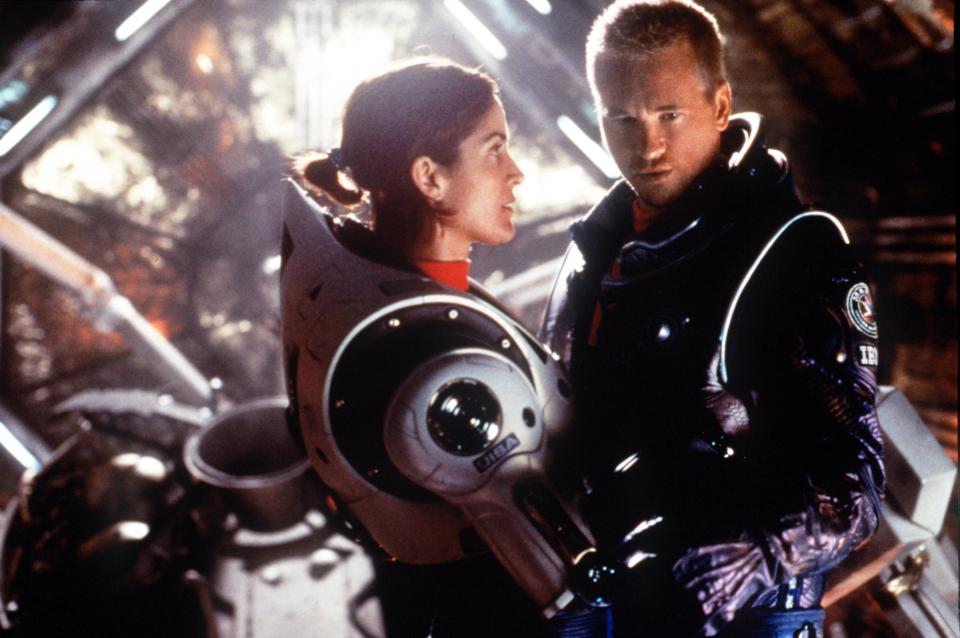Ten films that got the science really wrong

Directors may tell us they constantly strive for accuracy, but that’s definitely not always the case when it comes to movie science. We asked Dr David A Kirby, senior lecturer in science communication studies at the University of Manchester and author of Lab Coats in Hollywood, for 10 films which went spectacularly awry when it comes to scientific authenticity.
Be aware, there are SPOILERS.
Lucy (2014)
“[Director] Luc Besson essentially indicated that he didn’t care the science in it was terrible,” says Dr Kirby of the action flick in which Scarlett Johansson ingests a drug that turns her superhuman.
“It plays off this myth we only use 10% of our brains. It’s a very long-standing myth but it’s totally inaccurate [and] I don’t like the idea of a movie perpetuating such a scientific myth and doing it so overtly and so carelessly.”
Read more: Actors who made movies they didn’t want to
But that’s not all that’s wrong with it. “It has incorrect notions of what evolution is and what it means,” he adds. “There’s no spontaneous evolution.”
The Happening (2008)

This M Night Shyamalan pic about people mysteriously committing suicide en masse was a massive flop. Turns out the plants did it.
“A lot of it makes no sense – why would the plants specifically target humans? And humans in a group?” says Dr Kirby.
But could plants ‘attack’? “The idea of plants impacting the environment is fairly true – an onion affects all the plants around it – but the way in which this movie tries to portray that and extrapolate out is insane.”
“The thing that’s even worse is [Mark Wahlberg] plays a science teacher and his philosophy is, ‘there are things we can’t understand’. I don’t know about you, but my understanding of scientists is they want to know, that’s the idea. The creationist subtext that’s in The Happening makes it a somewhat dangerous film, if it weren’t so inept.”
The Core (2003)

“For my book, I interviewed the science consultant for this film,” explains Dr Kirby. “He was frustrated because the screenwriter felt he knew more science than the scientist. This idea that the Earth’s core had stopped spinning was nonsensical, but the scriptwriter, who had an undergraduate degree in physics, thought this was a reasonable hypothesis.”
So the centre of our planet couldn’t stop rotating? “The idea of the core stopping spinning is ridiculous. It’s essentially a molten metal that’s magnetic. It’s not some inside spinning ball.”
Prometheus (2012)
Ridley Scott’s Alien prequel tries to get some of the science right, but that’s not what rubs Dr Kirby up the wrong way.
“It’s the portrayal of the scientists in that which really drives me crazy,” he says. “The geologist character gets lost. The biologist character is seeing an alien life form for the first time and he treats it like a cat that’s stuck under a couch. They make no sense in the ways in which they act.”
Armageddon (1998)

Michael Bay will be very disappointed to hear that the science in this Bruce Willis blockbuster about stopping an impending asteroid is rubbish.
“The whole idea of an asteroid the size of Texas, that we wouldn’t recognise that until 19 days before it hit, it’s crazy,” says Dr Kirby.
Read more: Battlefield Earth’s most scathing reviews
“An asteroid, unlike a comet, has a regular trajectory that you can map.”
It’s also unlikely we’d send a motley crew of oil drillers to bury nuclear weapons on the asteroid’s surface. “From the people that I’ve talked to, the idea is that if you were going to use nuclear weapons you would fire them from the Earth, or you would use an unmanned spaceship.”
Red Planet (2000)

NASA refused to participate in the film because one astronaut kills another, but that’s not the reason Dr Kirby dislikes this early noughties Val Kilmer drama about colonising Mars.
“The whole plot hinges on this idea that there are insects lying dormant in the Martian soil that re-emerge because we’ve put algae on the surface,” he explains. “The idea of these swarms of insects existing on Mars already, that’s pretty crazy.” (the film also calls them nematodes, which is actually a microscopic worm, not the beetle-like creatures in the movie).
More fundamentally, the screenplay also gets the building blocks of DNA wrong.
“They talk about A, G, T and P when really they’re A, G, T and C. That’s actually some pretty basic science.”.
2012 (2009)

You won’t be surprised to hear that Roland Emmerich’s end-of-the-world action movie doesn’t have much basis in fact.
“This has the great ludicrous line, ‘the neutrinos are mutating!” and that’s a totally nonsensical line, it doesn’t mean anything,” says Dr Kirby. “That’s pretty much why this gets on the list. The explanation for why things are happening doesn’t make sense in any way.”
Knowing (2009)

Nicolas Cage is an MIT astrophysics professor whose son discovers a number sequence written by a little girl which seems to predict a series of disasters and ultimately the end of the world.
“The idea of the numerology stuff is very problematic,” says Dr Kirby. “The way we can read the numbers and figure out how future events are going to be playing. Numerology is more a cult than it is scientific. It’s really a pseudoscience and the film takes that as sort of real science and that’s a problem.”
Volcano (1997)

The images of Tommy Lee Jones fighting off molten lava on the streets of Hollywood looks good, but is complete nonsense. “The idea of a dormant volcano housed under Los Angeles is really bad geology and many geologists were unhappy with that notion,” says Dr Kirby.
Read more: The most dangerous movie sets
“There has to be some volcanic activity happening there. It would be like a volcano erupting in Manchester – there’s no volcanic activity here so that wouldn’t happen.”
The 6th Day (2000)

What?! An Arnold Schwarzenegger film in which his character gets cloned isn’t accurate?
“This one has clones that are fully-grown and they come with their memories intact,” says Dr Kirby. “And from the perspective of biology, that’s totally outlandish.
A clone is a genetic replica of an individual, but like Dolly the Sheep, it had to start as a single cell and go through the normal developmental process that anything goes through.
[Also], we don’t inherit memories. There were some studies back in the 1970s using flatworms that people thought indicated we could but those have all been disproven.”
Watch the latest videos from Yahoo UK

 Yahoo Movies
Yahoo Movies 
